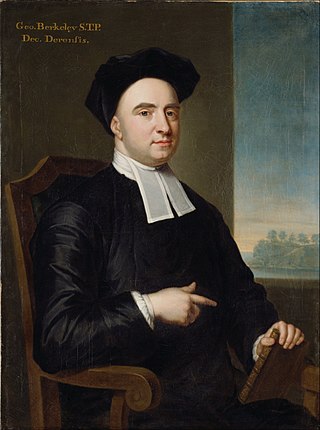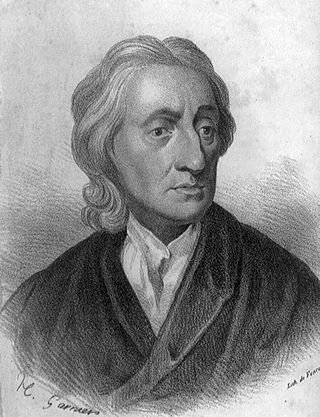
An Enquiry Concerning Human Understanding is a book by the Scottish empiricist philosopher David Hume, published in English in 1748. It was a revision of an earlier effort, Hume's A Treatise of Human Nature, published anonymously in London in 1739–40. Hume was disappointed with the reception of the Treatise, which "fell dead-born from the press," as he put it, and so tried again to disseminate his more developed ideas to the public by writing a shorter and more polemical work.

George Berkeley – known as Bishop Berkeley – was an Anglo-Irish philosopher whose primary achievement was the advancement of a theory he called "immaterialism". This theory denies the existence of material substance and instead contends that familiar objects like tables and chairs are ideas perceived by the mind and, as a result, cannot exist without being perceived. Berkeley is also known for his critique of abstraction, an important premise in his argument for immaterialism.
George Sotiros Pappas is a professor of philosophy at Ohio State University. Pappas specializes in epistemology, the history of early modern philosophy, philosophy of religion and metaphysics. He is of Greek and English origin.
Idealism in philosophy, also known as philosophical idealism or metaphysical idealism, is the set of metaphysical perspectives asserting that, most fundamentally, reality is equivalent to mind, spirit, or consciousness; that reality is entirely a mental construct; or that ideas are the highest type of reality or have the greatest claim to being considered "real". Because there are different types of idealism, it is difficult to define the term uniformly.
Materialism is a form of philosophical monism which holds that matter is the fundamental substance in nature, and that all things, including mental states and consciousness, are results of material interactions of material things. According to philosophical materialism, mind and consciousness are caused by physical processes, such as the neurochemistry of the human brain and nervous system, without which they cannot exist. Materialism directly contrasts with idealism, according to which consciousness is the fundamental substance of nature.
Substance theory, or substance–attribute theory, is an ontological theory positing that objects are constituted each by a substance and properties borne by the substance but distinct from it. In this role, a substance can be referred to as a substratum or a thing-in-itself. Substances are particulars that are ontologically independent: they are able to exist all by themselves. Another defining feature often attributed to substances is their ability to undergo changes. Changes involve something existing before, during and after the change. They can be described in terms of a persisting substance gaining or losing properties. Attributes or properties, on the other hand, are entities that can be exemplified by substances. Properties characterize their bearers; they express what their bearer is like.
In philosophy, a noumenon is knowledge posited as an object that exists independently of human sense. The term noumenon is generally used in contrast with, or in relation to, the term phenomenon, which refers to any object of the senses. Immanuel Kant first developed the notion of the noumenon as part of his transcendental idealism, suggesting that while we know the noumenal world to exist because human sensibility is merely receptive, it is not itself sensible and must therefore remain otherwise unknowable to us. In Kantian philosophy, the noumenon is often associated with the unknowable "thing-in-itself". However, the nature of the relationship between the two is not made explicit in Kant's work, and remains a subject of debate among Kant scholars as a result.

Nicolas Malebranche was a French Oratorian Catholic priest and rationalist philosopher. In his works, he sought to synthesize the thought of St. Augustine and Descartes, in order to demonstrate the active role of God in every aspect of the world. Malebranche is best known for his doctrines of vision in God, occasionalism and ontologism.

Subjective idealism, or empirical idealism or immaterialism, is a form of philosophical monism that holds that only minds and mental contents exist. It entails and is generally identified or associated with immaterialism, the doctrine that material things do not exist. Subjective idealism rejects dualism, neutral monism, and materialism; it is the contrary of eliminative materialism, the doctrine that all or some classes of mental phenomena do not exist, but are sheer illusions.

An Essay Concerning Human Understanding is a work by John Locke concerning the foundation of human knowledge and understanding. It first appeared in 1689 with the printed title An Essay Concerning Humane Understanding. He describes the mind at birth as a blank slate filled later through experience. The essay was one of the principal sources of empiricism in modern philosophy, and influenced many enlightenment philosophers, such as David Hume and George Berkeley.

A Treatise Concerning the Principles of Human Knowledge is a 1710 work, in English, by Irish Empiricist philosopher George Berkeley. This book largely seeks to refute the claims made by Berkeley's contemporary John Locke about the nature of human perception. Whilst, like all the Empiricist philosophers, both Locke and Berkeley agreed that we are having experiences, regardless of whether material objects exist, Berkeley sought to prove that the outside world is also composed solely of ideas. Berkeley did this by suggesting that "Ideas can only resemble Ideas" – the mental ideas that we possess can only resemble other ideas and thus the external world consists not of physical form, but rather of ideas. This world is given logic and regularity by some other force, which Berkeley concludes is God.
The master argument is George Berkeley's argument that mind-independent objects do not exist because it is impossible to conceive of them. The argument is against the intuitions that many have and has been widely challenged. The term "Berkeley's master argument" was introduced by Andre Gallois in 1974. His term has firmly become currency of contemporary Berkeley scholarship.
Arthur Collier was an English Anglican priest and philosopher who wrote about the non-existence of an absolute external world.
Hypokeimenon, later often material substratum, is a term in metaphysics which literally means the "underlying thing".

The primary–secondary quality distinction is a conceptual distinction in epistemology and metaphysics, concerning the nature of reality. It is most explicitly articulated by John Locke in his Essay concerning Human Understanding, but earlier thinkers such as Galileo and Descartes made similar distinctions.
Colin Murray Turbayne was an Australian philosopher and an internationally recognized authority on the writings of George Berkeley. He spent most of his thirty five year academic career at the University of Rochester and was noted as the author of the book The Myth of Metaphor.
The following outline is provided as an overview of and topical guide to metaphysics:
This is a list of philosophical literature articles.
Mechanism is the belief that natural wholes are similar to complicated machines or artifacts, composed of parts lacking any intrinsic relationship to each other.







